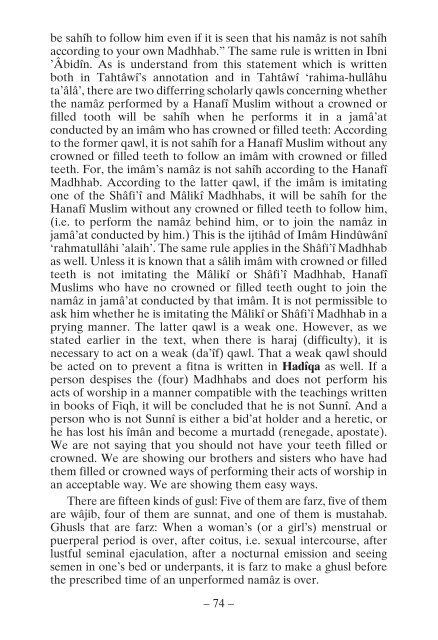Miftah-ul-Janna (Booklet for way to Paradise)
Create successful ePaper yourself
Turn your PDF publications into a flip-book with our unique Google optimized e-Paper software.
e sahîh <strong>to</strong> follow him even if it is seen that his namâz is not sahîh<br />
according <strong>to</strong> your own Madhhab.” The same r<strong>ul</strong>e is written in Ibni<br />
’Âbidîn. As is understand from this statement which is written<br />
both in Tahtâwî’s annotation and in Tahtâwî ‘rahima-h<strong>ul</strong>lâhu<br />
ta’âlâ’, there are two differring scholarly qawls concerning whether<br />
the namâz per<strong>for</strong>med by a Hanafî Muslim without a crowned or<br />
filled <strong>to</strong>oth will be sahîh when he per<strong>for</strong>ms it in a jamâ’at<br />
conducted by an imâm who has crowned or filled teeth: According<br />
<strong>to</strong> the <strong>for</strong>mer qawl, it is not sahîh <strong>for</strong> a Hanafî Muslim without any<br />
crowned or filled teeth <strong>to</strong> follow an imâm with crowned or filled<br />
teeth. For, the imâm’s namâz is not sahîh according <strong>to</strong> the Hanafî<br />
Madhhab. According <strong>to</strong> the latter qawl, if the imâm is imitating<br />
one of the Shâfi’î and Mâlikî Madhhabs, it will be sahîh <strong>for</strong> the<br />
Hanafî Muslim without any crowned or filled teeth <strong>to</strong> follow him,<br />
(i.e. <strong>to</strong> per<strong>for</strong>m the namâz behind him, or <strong>to</strong> join the namâz in<br />
jamâ’at conducted by him.) This is the ijtihâd of Imâm Hindûwânî<br />
‘rahmat<strong>ul</strong>lâhi ’alaih’. The same r<strong>ul</strong>e applies in the Shâfi’î Madhhab<br />
as well. Unless it is known that a sâlih imâm with crowned or filled<br />
teeth is not imitating the Mâlikî or Shâfi’î Madhhab, Hanafî<br />
Muslims who have no crowned or filled teeth ought <strong>to</strong> join the<br />
namâz in jamâ’at conducted by that imâm. It is not permissible <strong>to</strong><br />
ask him whether he is imitating the Mâlikî or Shâfi’î Madhhab in a<br />
prying manner. The latter qawl is a weak one. However, as we<br />
stated earlier in the text, when there is haraj (diffic<strong>ul</strong>ty), it is<br />
necessary <strong>to</strong> act on a weak (da’îf) qawl. That a weak qawl sho<strong>ul</strong>d<br />
be acted on <strong>to</strong> prevent a fitna is written in Hadîqa as well. If a<br />
person despises the (four) Madhhabs and does not per<strong>for</strong>m his<br />
acts of worship in a manner compatible with the teachings written<br />
in books of Fiqh, it will be concluded that he is not Sunnî. And a<br />
person who is not Sunnî is either a bid’at holder and a heretic, or<br />
he has lost his îmân and become a murtadd (renegade, apostate).<br />
We are not saying that you sho<strong>ul</strong>d not have your teeth filled or<br />
crowned. We are showing our brothers and sisters who have had<br />
them filled or crowned <strong>way</strong>s of per<strong>for</strong>ming their acts of worship in<br />
an acceptable <strong>way</strong>. We are showing them easy <strong>way</strong>s.<br />
There are fifteen kinds of gusl: Five of them are farz, five of them<br />
are wâjib, four of them are sunnat, and one of them is mustahab.<br />
Ghusls that are farz: When a woman’s (or a girl’s) menstrual or<br />
puerperal period is over, after coitus, i.e. sexual intercourse, after<br />
lustf<strong>ul</strong> seminal ejac<strong>ul</strong>ation, after a nocturnal emission and seeing<br />
semen in one’s bed or underpants, it is farz <strong>to</strong> make a ghusl be<strong>for</strong>e<br />
the prescribed time of an unper<strong>for</strong>med namâz is over.<br />
– 74 –

















